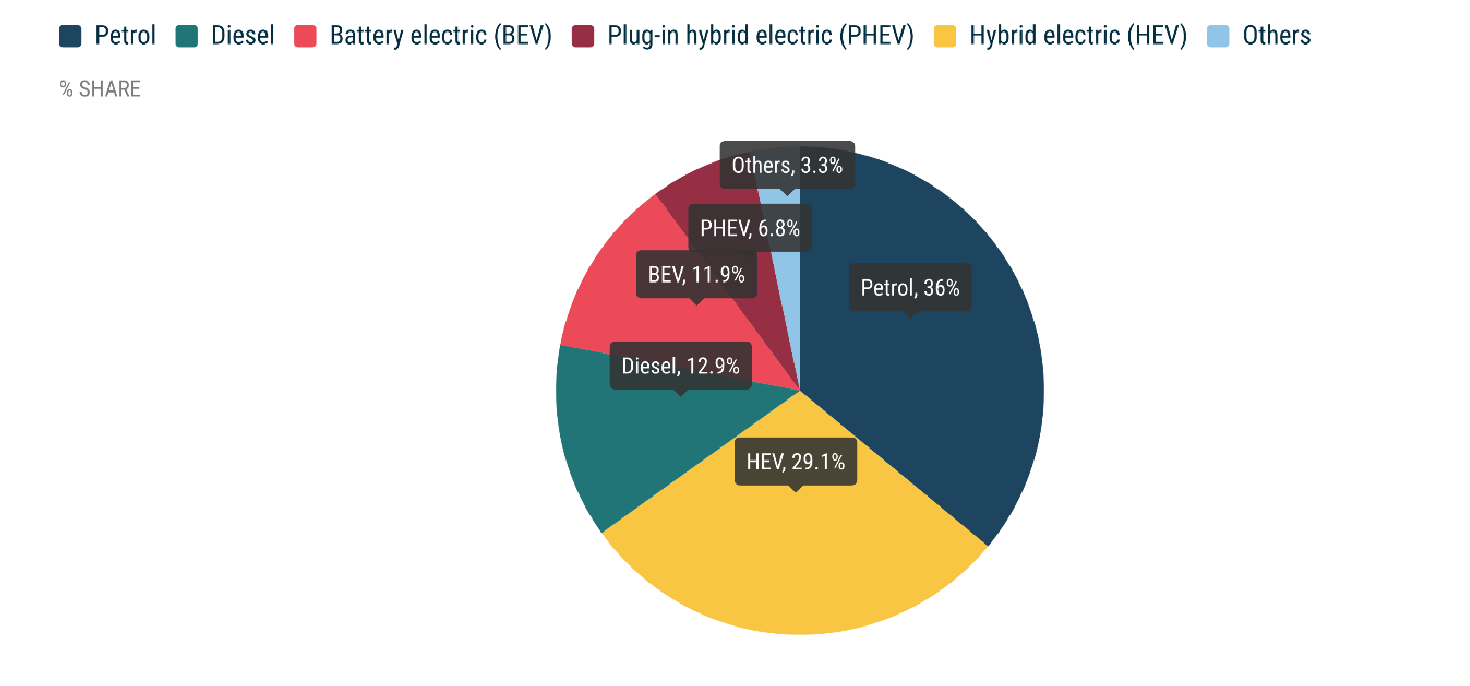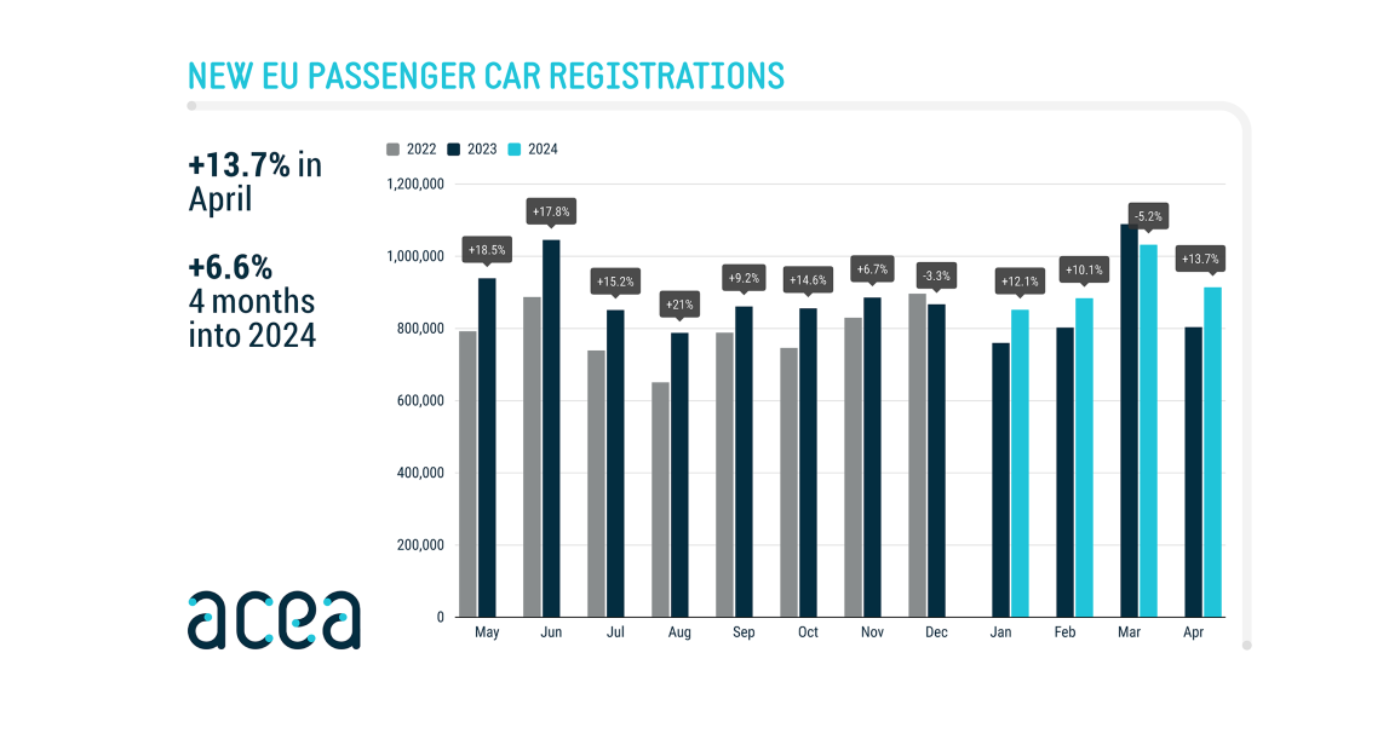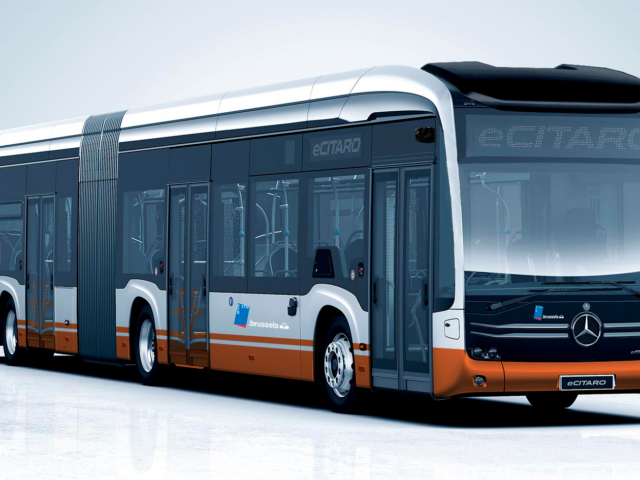According to the figures of the European Car Manufacturers Association (ACEA), the European Union car market grew by 13.7% in April 2024. New registrations totaled 913,995 units, driven by strong increases across all major markets: Spain (+23.1%), Germany (+19.8%), France (+10.9%), and Italy (+7.7%).
This growth can be partly explained by the two extra sales days compared to the same month last year when the Easter holidays fell in April.
During the first four months of the year, new car registrations in the European Union increased by 6.6%, reaching nearly 3.7 million units. Solid growth was recorded in the region’s largest markets over the period, with Germany and Spain each seeing a 7.8% increase, followed by France (+7%) and Italy (+6.1%).
By power source
Last April, battery-electric cars maintained nearly 12% of the EU car market, while hybrid-electrics rose to 29.1% from 24.9%. The combined share of petrol and diesel vehicles dropped to less than half the market, at 48.9%, down from 52.8%.

Electric
In April 2024, battery-electric car registrations rose by 14.8% to 108,552 units, with their market share holding steady at around 12%. France and Belgium saw significant increases of 45.2% and 41.6%, respectively, while Germany remained stable (-0.2%).
From January to April, a total of 441,992 new battery-electric cars were registered, marking a 6.4% increase from the previous year.
Hybrid
Hybrid-electric cars also saw robust growth, with registrations up 33.1% in April. The largest markets for this segment, France (+48.1%), Spain (+38.5%), Germany (+25.9%), and Italy (+22.8%), all recorded double-digit increases, with registrations totaling 265,992 units. This pushed the hybrid-electric market share to 29.1%, up from 24.9% in April 2023.
Plug-in hybrid
Plug-in hybrid car registrations saw a modest increase of 3.7% last month. While Belgium experienced a significant decline of 17.6% and France remained stable (-0.1%), Germany’s strong performance, with a 28.4% increase, helped balance the segment. In April, plug-in hybrids accounted for 6.8% of the total car market, with 62,148 units sold.
Petrol
In April 2024, petrol car sales increased by 7.3% to 328,967, driven by double-digit gains in key markets such as Spain (+24.1%), Germany (+18.6%), and Italy (+14.1%). However, their market share declined from 38.1% to 36% compared to the same month the previous year.
Diesel
Meanwhile, the diesel car market remained steady at around 118,000 units, accounting for nearly 13% of the market. Despite substantial declines in major markets like Italy (-21.1%), Spain (-19.3%), and France (-18.1%), a significant increase in Germany (+28.2%) helped to offset these losses.
EFTA + UK
We see slightly different tendencies in the UK and the EFTA countries (Iceland, Norway, Switzerland). Within EFTA electric car sales are up 18.2% compared to April 2023, plug-in hybrids shrunk by 9.4%, and hybrid electrics rose by 21,4%. In the UK, the figures were +10,7%, +22,1%, and +11%, respectively.
Petrol cars still increased slightly within EFTA (+2,1%), while they decreased by 10,8% in the UK. The same evolution goes for diesel but with higher numbers: diesel sales went up by 28,8% (most so in Iceland), while diesel sales in the UK slumped again by 28,4%.
By make
Looking at the different manufacturing groups and brands, the Volkswagen Group is still firmly in the number one position with a 27.8% market share, increasing its sales by 15.5% compared to April 2023. Stellantis Group stays second (16.7% market share, +1.7% sales), and Renault Group is third with 11.1% market share and +11% in sales.
Hyundai Group stays in fourth position (but just at 8.1% market share), thanks to good Hyundai sales (+20.9%), compensating for the decline in Kia sales (-12.6%). Toyota Group, fifth, is performing very well. In April 2024, it increased its market share to 8% (up from 6.2%) by selling 47.3% more cars.
BMW Group is sixth, with a 6.6% market share and an 11.5% sales increase, despite the decline of Mini (-32.9%), which is in a model change. Mercedes-Benz stays in 7th position (5% market share, +4.2% sales).
Other remarkable feats include Volvo’s 9th place, with an almost 3% market share and a sales increase of 63.5%, and Suzuki, Mazda, and Mitsubishi, which are also doing very well. The Japanese revival is symbolized by Honda, which increased its April sales by 155.4% and doubled its (modest) market share. Tesla, on the other hand, is stagnating, seeing a slight sales increase of 3% but a disappointing market share of 1.2%.




Comments
Ready to join the conversation?
You must be an active subscriber to leave a comment.
Subscribe Today